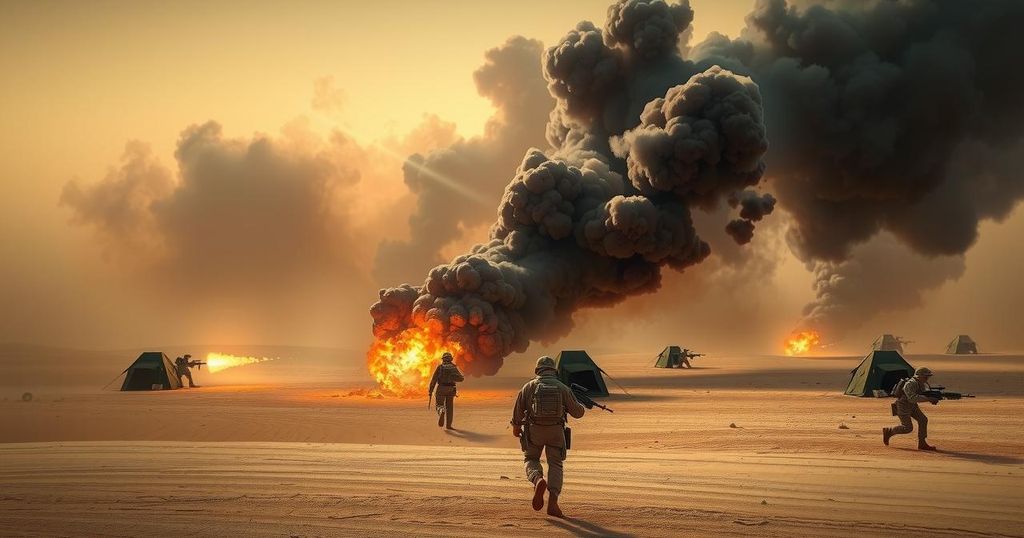Mali Army Camp in Timbuktu Under Attack; Global Events Highlight Security Issues

An army camp in Timbuktu, Mali, faced an attack from terrorists, with eyewitnesses describing heavy gunfire and explosions. Concurrently, the Philippines initiated a security dialogue with the EU addressing cyber concerns. In India’s northeast, floods caused multiple deaths and evacuation efforts. A bomb blast in Nigeria resulted in nine fatalities, while in Sweden, a commission recommends halting international adoptions due to chronic abuses. Meanwhile, a shooting incident in France highlights rising hate crimes.
Fast Summary
An army camp in Timbuktu, Mali, faced an attack on Monday from terrorists, marked by heavy gunfire, as confirmed by military and local officials. Amidst ongoing violence from jihadist groups, residents reported hearing gunfire and explosions. Concurrently, the Philippines announced plans to engage in a security dialogue with the European Union, while heavy floods in India’s northeast led to multiple fatalities and evacuation efforts. In Nigeria, a bomb blast claimed nine lives at a bus park, and in Sweden, a commission has urged a halt to international adoptions following a fraud investigation. Lastly, a racially motivated shooting in France has reignited discussions about rising hate crimes.
Article Body
An alarming attack struck an army camp in Timbuktu, Mali this past Monday. Reports from military sources, local officials, and residents reveal the chaos. They declared that terrorists were launching an offensive and described heavy gunfire echoing throughout the area. The ongoing violence in Mali, characterized by threats from jihadist factions connected to Al-Qaeda and ISIS, continues to impose fear among the populace.
A military insider provided details, stating, “We are dealing with terrorists attacking Timbuktu. We are fighting back.” The source further confirmed that the camp located in the central part of the city was under direct assault. A local official added to the narrative. “The terrorists arrived today in Timbuktu with a vehicle packed with explosives. The vehicle exploded near the (military) camp. Shooting is currently continuing.”
The situation prompted UN staff to take cover and avoid proximity to windows in light of the ongoing gunfire within the city. A local resident reported hearing significant gunfire, speculating it originated near the military post. Additionally, a journalist on the scene described the conflict in a stark manner, stating, “The city is under fire.” Everyone was urged to stay indoors.
Timbuktu, an ancient city known for its rich history, had suffered deplorable destruction under jihadist control in previous years. Its significance as a cultural center has been marred by violence, a grim reminder of the ongoing conflict in the region.
Shifting focus to diplomatic efforts, the Philippines’ Foreign Affairs Secretary Enrique Manalo announced the launch of a bilateral security and defense dialogue with the European Union on Monday, during a press conference alongside the EU’s foreign policy chief, Kaja Kallas. Manalo noted this partnership aims to address pressing issues like cyberattacks and foreign interference.
Manalo expressed optimism regarding this initiative: “Our relationship reaches another significant milestone with our decision to create a security and defense dialogue.” In particular, the dialogue seeks to tackle emerging security concerns that traverse national borders, and Kallas echoed the necessity for collaborative effort amid current geopolitical challenges.
The inaugural meeting for this dialogue is set for the last quarter of 2025. Additionally, both parties have plans to discuss a free trade agreement, expressing mutual commitment towards a comprehensive and balanced accord. The next negotiation round will take place in Brussels come June.
In a grim report from northeast India, authorities indicated that at least 34 individuals have succumbed to heavy floods causing landslides. As of Monday, government actions have included evacuation of over a thousand tourists in Sikkim. In Bangladesh, tragic events included a family losing four members due to landslides.
In another tragic event, Nigeria experienced a bomb blast at a bus park in Borno state that claimed nine lives. Reports suggest that militants are increasingly employing improvised explosives as they target civilians. The local lawmaker for the area confirmed the alarming rise in attacks linked to Boko Haram and other factions.
In Sweden, a commission is urging a halt to international adoptions following an investigation that revealed widespread abuse and fraud over the decades. This inquiry has shed light on disturbing practices, including child trafficking. The need for a formal apology to affected families has been highlighted in the discussions following these findings.
Lastly, France witnessed a racially charged shooting wherein a Tunisian national was killed by a neighbor. This incident adds to the growing concern over hate crimes in the country, which saw an 11 percent rise in such incidents the previous year. Discussions are intensifying about the situation’s implications for the country’s social fabric.
Conclusion
The series of events in Mali, the Philippines, India, Nigeria, Sweden, and France reflect an ongoing narrative of violence, diplomatic efforts, and societal challenges. From military attacks in Timbuktu to the rise of hate crimes in Europe, the international community is facing complex issues that necessitate urgent action and collaborative solutions. While some countries seek to strengthen security ties, others grapple with the devastating repercussions of natural disasters and terrorist activities. The overarching theme remains the need for active engagement and accountability in addressing today’s pressing global issues.
The series of incidents occurring in various regions, including the attack in Timbuktu, the Philippines’ new defense dialogues, catastrophic floods in India, bombings in Nigeria, adoption fraud in Sweden, and racially charged violence in France, underscore a global landscape marked by tension, crises, and the pursuit of reform. Each story reflects a complex interplay between local challenges and international responses, suggesting an urgent need for collaboration and proactive efforts across borders to handle these evolving issues.
Original Source: www.arabnews.pk








